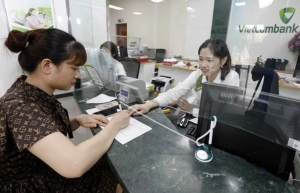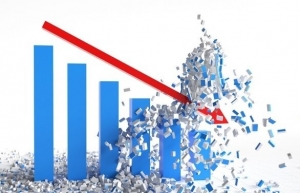Lending slowdown threatens to delay real estate recovery
 |
| Rule amendments have been issued on operational safety ratios and lending consistency, photo Le Toan |
Vietnam has witnessed a downward trend of credit growth in the beginning month of 2024, with lending decreasing by 0.33 per cent against the end of last year, as of March 18.
Phan Duc Tu, chairman of BIDV’s Board of Directors, said, “Over the first 80 days of 2024, BIDV has disbursed loans totalling $18.95 billion to the economy. However, the figure is lower than its debt repayment of $19.55 billion. As of March 11, the bank’s outstanding balance contracted approximately 1 per cent compared with the end of 2023.”
Nguyen Duc Vinh, CEO of VPBank, reported a similar trend. “VPBank has more than 40,000 enterprises, with a credit limit of $9.67 billion. However, currently, only over $2.42 billion has been disbursed due to various reasons,” he said.
Agribank chairman Pham Duc An said, “After the first three months of 2024, Agribank’s income and expenditure gap decreased by $80.6 million compared with the same period last year.”
There are several reasons behind the slowdown in lending. Among them, corporate customers are qualified for loans, but they do not have manufacturing plans or good consumption markets. The collateral mechanism lacks flexibility. Furthermore, there is no guarantee from regulatory bodies when providing loans to businesses suffering losses.
In the real estate sector, the hottest segment for bank loans, debt servicing capacity will remain weak even as cash flow improves due to high leverage and substantial debt maturities in 2024. The sector’s debt/earnings before interest, taxes, depreciation, and amortisation ratio rose to 8.7-fold in 2023 from 7-fold a year ago, as debt growth surpassed profit growth, according to a report released by VIS Rating last week.
The report noted that around $5.24 billion worth of developer-issued bonds are maturing in 2024, the highest level in the last five years. Developers who are embroiled in legal issues and/or speculative projects are the most at risk of poor sales and cash proceeds, weak debt coverage, and defaults, and hence, are most in need of refinancing.
Phan Thi Van Anh, director and senior analyst of VIS Rating, said, “The banking sector’s capital level will generally move sideways in 2024. Only a few banks have announced plans to increase capital. In general, the capital adequacy ratio of the banking sector will remain at a low level of about 11-12 per cent.”
“The bad debt coverage ratio of small- and medium-sized private banks will be lower than the sector’s average. The main reason is that it takes longer to improve the provision ratio after a sharp decline in asset quality in 2023,” she added.
In addition, the State Bank of Vietnam (SBV) has recently drafted a number of amendments to current circulars on operational safety ratios and on lending activities to be consistent with the Law on Credit Institutions.
Nguyen Thu Ha, deputy director of SSI Investment Consulting and Development Center, said, “The amendments show SBV’s determination in keeping a strict management perspective on the lending activities for borrowers whose purpose is to make deposits under land/project transferring contract. Accordingly, the clause on putting such disbursement into an escrow account was kept unchanged in the new draft, opposing developer requests.”
There were also stricter requirements on disclosing related parties in the loan contract to address the issue of related lending activities, Ha added.
“These are in line with our expectations that one of the key focuses of the SBV going forward would be mitigating related lending activities to ensure the system’s safety. Although the purpose of this clause is clear, effective enforcement essentially hinges on both the truthful statements of the borrowers, as well as the time and effort banks spend during the verification processes,” Ha said.
 | Central bank promotes consumer lending The State Bank of Vietnam (SBV) has requested credit institutions and branches of foreign banks to boost consumer lending as part of efforts to prevent loan sharks who have targeted vulnerable people. |
 | Lending interest rates continue on downward trend Commercial banks have reduced lending rates in favour of business and production activities, but borrowing remains low. |
What the stars mean:
★ Poor ★ ★ Promising ★★★ Good ★★★★ Very good ★★★★★ Exceptional
Related Contents
Latest News
More News
- Private capital funds as cornerstone of IFC plans (February 20, 2026 | 14:38)
- Priorities for building credibility and momentum within Vietnamese IFCs (February 20, 2026 | 14:29)
- How Hong Kong can bridge critical financial centre gaps (February 20, 2026 | 14:22)
- All global experiences useful for Vietnam’s international financial hub (February 20, 2026 | 14:16)
- Raised ties reaffirm strategic trust (February 20, 2026 | 14:06)
- Sustained growth can translate into income gains (February 19, 2026 | 18:55)
- The vision to maintain a stable monetary policy (February 19, 2026 | 08:50)
- Banking sector faces data governance hurdles in AI transition (February 19, 2026 | 08:00)
- AI leading to shift in banking roles (February 18, 2026 | 19:54)
- Digital banking enters season of transformation (February 16, 2026 | 09:00)

 Tag:
Tag:



















 Mobile Version
Mobile Version